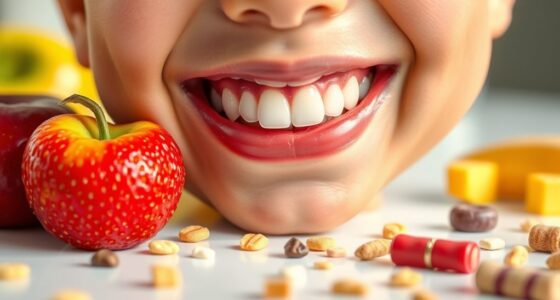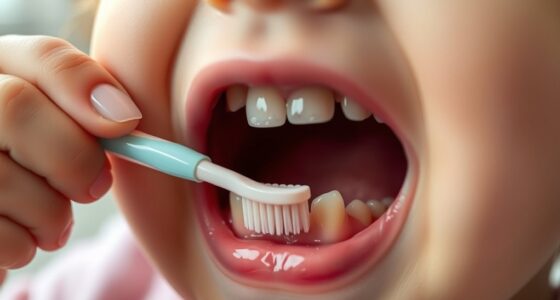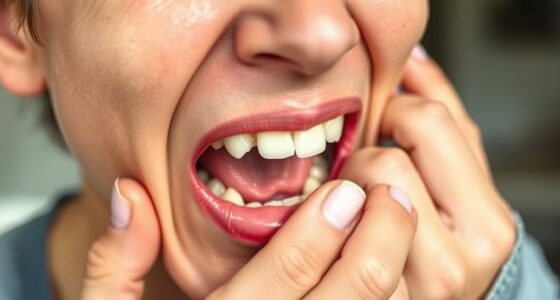During summer, many drinks like sugary sodas, fruit juices, lemonade, citrus, sports drinks, and flavored milks can harm your child’s teeth. These beverages are high in sugar and acid, which can cause cavities, weaken enamel, and lead to sensitivity. Sipping for long periods worsens the damage. To protect their smile, choose water and limit these harmful drinks. Keep exploring to find out how to keep your child’s teeth healthy all summer long.
Key Takeaways
- Sugary sodas and fruit juices feed bacteria, causing cavities and enamel erosion.
- Lemonade and citrus drinks are highly acidic, weakening tooth enamel and increasing sensitivity.
- Sports and energy drinks contain acids and sugars that promote decay and enamel damage.
- Flavored milk and non-dairy drinks often have added sugars, risking cavities and erosion.
- Extended sipping of acidic or sugary drinks prolongs acid contact, heightening enamel erosion and sensitivity.
Sugary Sodas and Fruit Juices
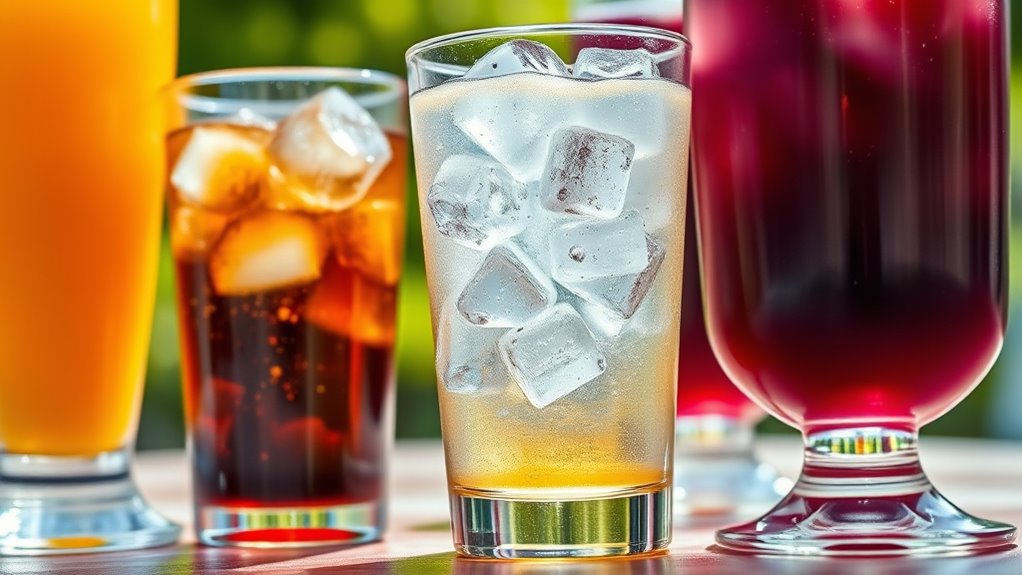
Sugary sodas and fruit juices are popular summer drinks, but they can harm your child’s teeth more than you might realize. These sugary drinks feed harmful bacteria in the mouth, increasing the risk of tooth decay and cavities.
The high levels of sugar and acids in sugary sodas and fruit juices also cause enamel erosion, weakening tooth enamel over time. This erosion leads to increased tooth sensitivity and long-term dental damage.
Frequent consumption without proper oral health habits can stain teeth and promote further decay. To protect your child’s dental health, limit sugary sodas and juices, and encourage drinking water instead. Additionally, choosing mineral-based sunscreens for your child’s skin can help prevent sun damage during outdoor activities.
Regular visits to a pediatric dentist can help monitor and maintain oral health, preventing the damaging effects of these beverages. Being aware of dental erosion and its causes can help you better understand how to safeguard your child’s teeth. Incorporating proper oral hygiene routines such as brushing and flossing can further reduce the risk of damage from these sugary drinks. Maintaining consistent oral care can also help counteract the effects of acidic beverages on tooth enamel.
Lemonade and Citrus Drinks
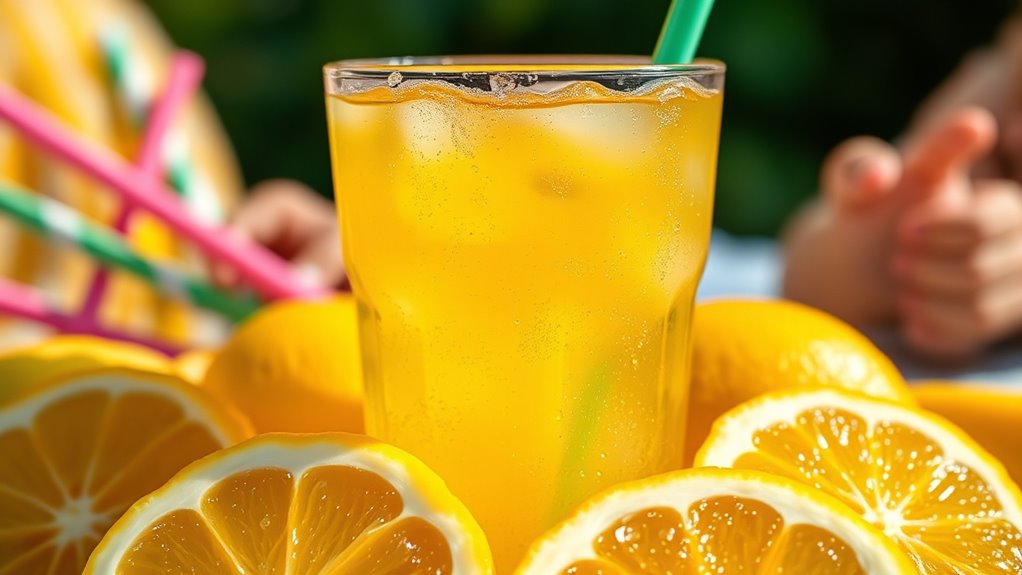
Lemonade and other citrus drinks are popular summer favorites, but their high acidity can pose serious risks to your child’s dental health. These citrus drinks, including lemonade, have pH levels often below 3, making them highly acidic.
Frequent consumption can weaken tooth enamel through acid erosion, leading to increased sensitivity and discoloration. The high sugar content in many citrus beverages fuels oral bacteria, raising the risk of cavities.
When your child sips lemonade or citrus drinks slowly, they prolong acid contact with teeth, they are increasing the likelihood of enamel damage. Over time, this dental erosion can compromise oral health, making teeth more prone to decay and staining. Understanding acid erosion highlights the importance of limiting acidic drink intake to protect your child’s teeth.
Understanding how acidic drinks impacts dental health highlights the importance of being mindful of habits that can harm your child’s oral health, such as frequent sipping of acidic drinks. Limiting these drinks and encouraging healthier choices helps protect your child’s teeth from the damaging effects of acidity. Additionally, rinsing with water after consuming citrus beverages can help neutralize acids and reduce enamel erosion and protect teeth.
Sports and Energy Drinks
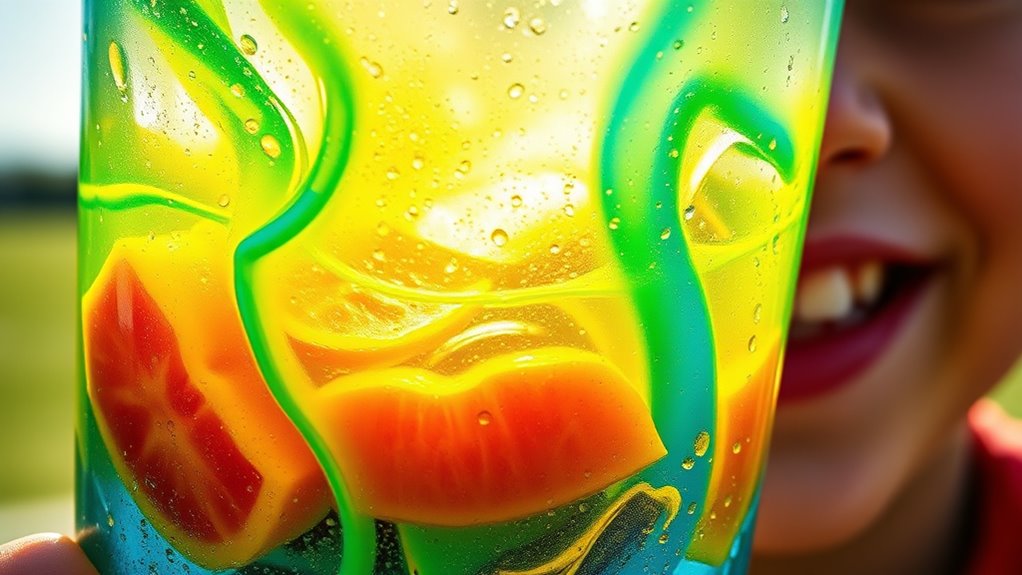
Although they’re often marketed as energizing or hydrating, sports and energy drinks can harm your child’s teeth. These beverages typically contain high sugar and acids, which can lead to enamel erosion and increase the risk of tooth decay.
Sports and energy drinks can damage children’s teeth due to high sugar and acid content.
The acidity weakens the protective enamel layer, making teeth more sensitive and prone to staining over time. Consuming sports drinks frequently or sipping them slowly extends acid contact with teeth, worsening erosion and decay. Using advanced filtration methods in these drinks can sometimes reduce their acidity, but most commercial options do not significantly differ in their erosive potential. Additionally, acidic pH levels in these beverages contribute to the breakdown of enamel, further compromising oral health. Regular exposure to these acids can also cause enamel demineralization, leading to long-term damage. Moreover, the presence of sugar content accelerates bacterial growth, increasing cavity risk.
The high sugar content also feeds bacteria, promoting plaque buildup and cavities. Additionally, the acidity in these drinks can impact color accuracy, which is crucial for maintaining the true appearance of your child’s teeth. To protect your child’s oral health, limit their intake of these drinks, use a straw to reduce contact, and rinse with water afterward.
These simple steps can help minimize the damage to their teeth from sports and energy drinks.
Flavored Milk and Non-Dairy Alternatives
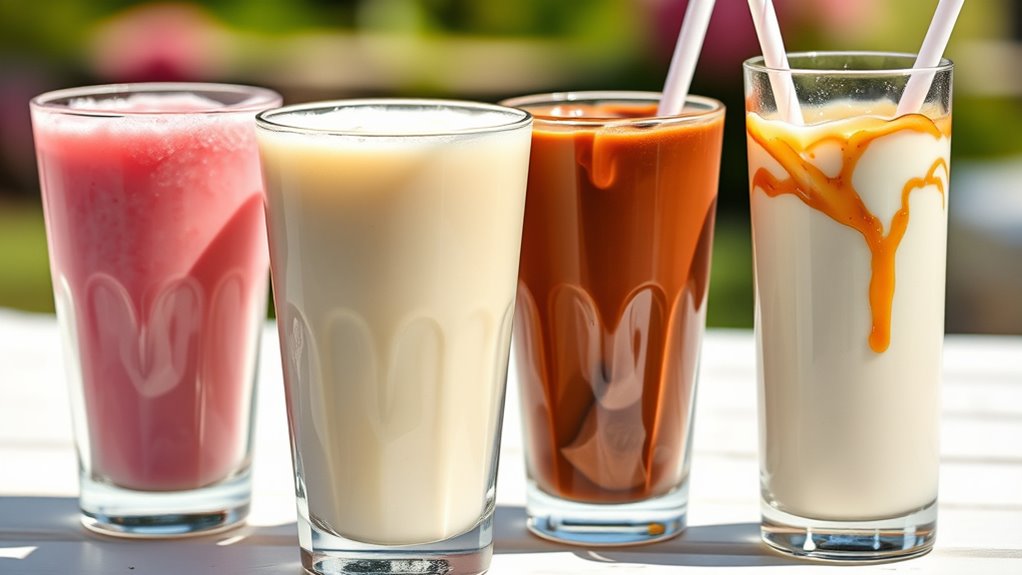
Flavored milk and non-dairy alternatives can pose a risk to your child’s dental health because many contain added sugars that promote tooth decay. These added sugars increase the risk of cavities and enamel erosion, especially when consumed frequently.
Some flavored milks have as much sugar as soft drinks, making them particularly harmful. Choosing plain, unsweetened milk or non-dairy options helps reduce sugar intake and protect enamel health. Educating yourself about sugar content in beverages can help you make more informed choices for your child’s diet. Additionally, understanding dental erosion causes can assist in preventing long-term oral health issues.
The calcium and vitamin D in plain milk support strong teeth and can help counteract the damaging effects of acidic or sugary beverages. Always read ingredient labels carefully to spot hidden added sugars in flavored or fortified milk alternatives.
Being aware of the impact of dietary habits on oral health can help you make better choices for your child’s teeth.
Extended Sipping and Its Effects

When children sip sugary or acidic drinks over a long period, their teeth face ongoing exposure to harmful substances. Extended sipping keeps acids and sugars in contact with tooth enamel, increasing the risk of dental erosion and cavities. Saliva’s ability to neutralize acids is overwhelmed, preventing proper remineralization. This continuous exposure softens enamel, making teeth more vulnerable to bacterial damage. Additionally, frequent sipping can lead to enamel deterioration, further compromising oral health. Regular exposure to these substances can also contribute to tooth sensitivity over time. Maintaining awareness of dental health practices is essential for prevention. Proper hydration with water helps wash away harmful substances and supports saliva function, which is vital for enamel protection. To illustrate, consider this:
| Effect of Extended Sipping | Result |
|---|---|
| Prolonged acid contact | Enamel softening and erosion |
| Increased sugar exposure | Higher risk of cavities |
| Reduced saliva action | Less remineralization |
Avoid prolonged sipping of sugary or acidic beverages to protect your child’s oral health, prevent dental erosion, and reduce cavities.
Frequently Asked Questions
What Drink Damages Teeth the Most?
The drink that damages teeth the most is sugary soda. It’s highly acidic and loaded with sugar, which erodes enamel and promotes cavities.
When you or your child drink soda regularly, the acids weaken the protective layer of teeth, making them more susceptible to decay.
To protect your child’s dental health, limit soda intake and encourage healthier choices like water or milk, which are gentler on teeth.
Which Liquid Damages Teeth the Most?
Are acidic, addictive beverages the biggest threat to your child’s teeth? You bet! These drinks, like sodas, sports drinks, and citrus juices, attack enamel with acidity and sugar, speeding up decay and damage.
When your child sips frequently, they prolong acid contact, increasing erosion and cavities. Protect their precious smile by limiting these liquids, encouraging water instead, and promoting good dental habits for healthier, happier teeth.
Is Gatorade Bad for Kids Teeth?
Yes, Gatorade can be bad for your kid’s teeth. It’s high in sugar and citric acid, which can erode enamel and cause cavities.
Sipping it repeatedly keeps acid in contact with their teeth longer, increasing damage.
To protect their smile, encourage using a straw, rinsing with water afterward, and limiting intake.
These steps help minimize the harmful effects of Gatorade on their dental health.
Are There Any Hot Drinks That Don’t Stain Teeth?
You’re wondering if any hot drinks won’t stain your child’s teeth. Hot herbal teas like chamomile or peppermint are good options since they’ve lower tannin levels, reducing staining.
Unsweetened hot milk or plant-based alternatives are gentle and don’t stain or erode enamel.
Also, hot cocoa made with unsweetened cocoa powder can be a safe choice if enjoyed in moderation and with good oral hygiene.
Conclusion
To keep your child’s teeth healthy this summer, be mindful of sugary drinks. For example, if Sarah constantly sips sweetened fruit juice, she might develop cavities over time. Instead, encourage water or plain milk to keep her teeth strong and prevent decay. By making simple swaps, you can help your child enjoy summer treats without risking dental health. Remember, small changes today can lead to healthier smiles tomorrow.


